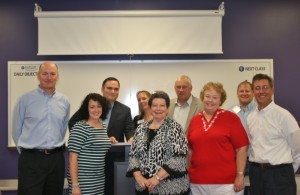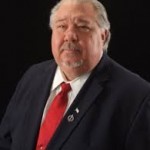
by | Jun 19, 2013
 Yesterday morning U.S. Senate hopeful David Young spoke to a large turnout at the monthly Polk GOP Conservative Breakfast held at the Iowa Motor Truck Association. Below is a re-cap of his speech, the issues he touched on, and some brief analysis.
Yesterday morning U.S. Senate hopeful David Young spoke to a large turnout at the monthly Polk GOP Conservative Breakfast held at the Iowa Motor Truck Association. Below is a re-cap of his speech, the issues he touched on, and some brief analysis.
Background
Still in the early stages of introducing himself to Iowa Republicans, he started from the beginning. He was born and raised in Van Meter where he grew up and participated in little league, Cub Scouts, and 4-H before finishing high school in Johnston and then going to Drake University.
Soon after graduating from Drake he headed to Washington D.C. where he eventually became Senator Chuck Grassley’s Chief of Staff. He described his time there by saying, “we battled the incompetence and arrogance of the Federal bureaucracy†and in general made the argument that through his interactions with Grassley’s staff and in dealing with constituent concerns he kept in touch with his Iowa roots.
3 Deficits
The bulk of the speech was framed around “three deficits†that Young sees as getting in the way of the American dream—our budget deficit, a ‘jobs deficitâ€, and a “deficit of accountabilityâ€.
The Budget Deficit
On the budget deficit he noted it was embarrassing our national debt is approaching $17 trillion, that neither party was without fault, and that he wished President Bush (43) would have used his veto power on more of the bills that passed Congress during his Presidency. He vowed to be an “equal opportunity watchdog Conservative†in terms of spending and went on record supporting a Balanced Budget Amendment to the Constitution. He pointed out that should Republicans take control of the Senate Mr.Grassley is in line to Chair the Judiciary Committee—which would have jurisdiction over this amendment—and pledged he would sponsor a bill to move this process forward. He then finished on the topic with one of the speech’s strongest lines—“it’s time for a Balanced Budget Amendment…it’s the greatest legacy we can leave our next generationâ€.
The “Jobs Deficitâ€
Young tied the “jobs deficit†to three separate current issues. The first of which was taxes, where he favors a “fairer, flatter, and simpler tax code for individuals and corporations.â€Â He repeatedly stressed the importance of making these reforms permanent in order to allow entrepreneurs and job creators the confidence to invest their current capital into the economy.
The second issue he views as a hindrance to job growth is the “Affordable Care Actâ€, saying, “We need to do all we can to repeal, de-fund, and slow down the biggest headache to our economy—Obamacareâ€. He made the case this legislation has forced companies, for their own survival, to turn full-time employees into part-timers against both the best interests and will of each.
Lastly, Young is in favor of passing the Keystone XL Pipeline as soon as possible under the guise that it will create jobs, help with our energy independence, and bolster our national security.
The “Accountability Deficitâ€
Given the current climate this argument wasn’t a tough one to make. He listed several in the long litany of Obama administration scandals and referenced the fact that Congress is suffering from its lowest approval ratings ever—which given its history is quite embarrassing. Of particular note here was that he received a large round of applause for saying that Attorney General Eric Holder needs to go.
Young concluded by saying he knows how the Senate works and would be able to “hit the ground runningâ€, that Bruce Braley is very beatable, and that he will be campaigning full-time and statewide over the next year.
Analysis
On substance Young’s speech was fine and hit all the right notes—particularly I believe Conservatives will be thrilled with his Balanced Budget Amendment stance—but to say his delivery lacks electricity would be an understatement. If this goes unaddressed, whether it’s true or not, a majority of voters will take this blandness as a lack of passion.
Also worth noting, as mentioned above, is the awkwardness in making the case that somehow he stayed connected to Iowans through Grassley’s other staff and by talking to constituents from Iowa on the phone. I know he feels the issue of him living in D.C. for almost two decades needs to be dealt with—but I can’t help but think this is not a successful way to do so.
All things considered, this event wasn’t overly positive or negative for Young. From his perspective it was certainly beneficial to get some speech giving experience in a small and supportive setting. Having never run for office before he has some kinks to work out and this was a good place to start that process. His growth as a candidate, or the lack thereof, will largely determine the level of success he enjoys over the next year.

by | Jun 17, 2013
 By Guest Writer Chad Brown–Polk County GOP Co-Chair and 3rd District Executive Committee Secretary
By Guest Writer Chad Brown–Polk County GOP Co-Chair and 3rd District Executive Committee Secretary
County leadership completed the re-activation of the District Executive Committees this weekend. District Executive Committees began to reactivate four months ago when the 4th Congressional District on February 12, 2013 at the Fort Dodge Public Library. This weekend, the 1st District Executive Committee met at Kaplan University in Cedar Falls and became the final Iowa Congressional District to re-activate. This meeting convened on Saturday, June 15, at 10:45 AM. Blackhawk County Chairman Scott Adkins served as Acting Chair and Blackhawk County District Executive Committee Member Chelle Adkins served as Acting Secretary. Much of the organization for this meeting was led by Chelle Adkins, who selected the meeting location because it was free of charge and suitable due to size. The meeting lasted 1 hour 55 minutes and included the election of officers, approval of the proposed rules, as well as discussing consistent statewide rules and working with other districts in the state.
“Our greatest benefit and ultimate goal in putting together our District Executive Committee is to help Republicans get elected,†said Marshall County Chair Pete Rogers. “We took the first step by fulfilling the State Party requirements. It’s a State Party requirement to exist.†Rogers, a native of Marshalltown, was unanimously elected permanent Chair of the 1st District Executive Committee. He led the meeting with much poise as he has been active in politics for decades. “At a minimum, this will help county organizations fulfill their needs and be more effective. We want to define best standards and practices and help each other meet our potential. At a maximum, there really is no maximum. As we get going, there is no limit as to what can be accomplished. This organizational step is a great step overall.â€
The race for Co-Chair was more competitive as three candidates were nominated. Dubuque County District Executive Committee member Will Johnson was nominated by Dubuque Chair Rick Holman. Benton Chair Tim Busch was nominated by Linn County Chair Cindy Golding. Linn County District Executive Committee member Jim Conklin was nominated by fellow Linn County District Executive Committee member Joni Scotter. This election was won by Busch, a native of Atkins.
“The 1st District Executive Committee set up the organization for future accomplishments today, and we met each other,†spoke Busch. “We want to establish common ground with each other and minimize our differences. We want to maximize our commonalities. Working together is the basis for our success.†Mr. Busch currently hosts the Benton County Facebook page as well as the Iowa 1st District Republicans Facebook page and has developed a Benton County Republican Central Committee Yahoo Group.
I am personally pleased the 1st District organized and completed the four month grassroots process of organization and re-activation that has occurred across the state. As Co-Chair of the most populated county in the state of Iowa, I understand the challenges that go along with my specific county organization. I also look forward to communicating more with surrounding counties to learn what works in other counties and to better glean institutional knowledge from other county leaders. Indeed, the re-activation of all four District Executive Committees is very important to me as this will help us reach our common goal. Also, as an active officer of the recently re-activated 3rd District Executive Committee, I have learned much about the challenges faced by those in my neighboring counties. This is due, in part, to meeting and speaking with leaders of other counties more often and getting to know them more closely than I had in the past. Several from the already formed District Executive Committees also came as visitors to help give their support to the members of the 1st District. I believe these other individuals also feel honored to be involved because they recognize the significance of the resource that our own newly organized D.E.C.’s provide to our various counties.
District Executive Committees have traditionally provided a vital ingredient to the success of the Republican Party in Iowa. Their important role is detailed in the RPI Constitution. Traditionally, the Republican Party is built as a grass roots Party that was always strong because it had a firm foundation and was built from the ground up. Unfortunately, the District Executive Committees were deactivated within recent years, and that vacuum was filled by powerful groups that dominated the leadership selection process by preventing Republican County leaders from talking to each other and promoting leadership from the grassroots. We want to protect the grassroots and include more people to the Republican Party.
“We elected some great leadership this morning,†said Jim Conklin. “This organization will provide better communication and better support for county central committees. We are in place to serve all twenty counties in 1st District.†Conklin narrowly defeated Benton County Co-Chair Bethany Gates in the race for Secretary.
The leadership of all four D.E.C.’s intend to be in close communication with each other throughout the summer. Republicans in Iowa have gained a powerful resource to build in terms of organization. All the continued efforts of county activists should provide candidates and county organizations with another tool to utilize in accomplishing significant victories in the 2014 election cycle.

by | Jun 13, 2013
 I have heard from three separate sources in recent days that former SCC member Drew Ivers is leaning toward a Senate primary run. Many have speculated that an Iowa libertarian would enter the race at some point—and as the Iowa Chair of Ron Paul’s 2012 presidential campaign Ivers certainly would fit this bill.
I have heard from three separate sources in recent days that former SCC member Drew Ivers is leaning toward a Senate primary run. Many have speculated that an Iowa libertarian would enter the race at some point—and as the Iowa Chair of Ron Paul’s 2012 presidential campaign Ivers certainly would fit this bill.
Whether this is true or not is unclear at the moment, but what is clear in my mind is the impact Ivers or any other legitimate Libertarian candidate would have on the race.
Besides the obvious—that the other candidate’s ability to pitch to and draw in Libertarians would be greatly diminished—there are many other ways this would shape the contest. Setting these aside for now, specifically from the Libertarian movement’s perspective there are 3 possible outcomes…and even the least desirable one would be a heck of a consolation prize. Here’s a brief look at the three things that could result should an Iowa Libertarian enter the contest:
Winning Outright
Though extremely improbable, in a large field of slightly lesser known candidates and with a solid pre-built network of passionate supporters that actually go vote…anything is conceivably possible. Iowa witnessed first-hand last cycle that Libertarian candidates can do well—this showed locally in Statehouse races and in the fact that Ron Paul finished a very close 3rd in the caucuses.
The hurdle in imagining a Liberty candidate winning outright—and why no one, including me, will ever predict it—is one of them would have to garner 35% of the statewide vote. You hate to say anything is impossible, but envisioning this is bordering on it. I will tell you this though, if someone was to make the argument, a semi-plausible case could be made with the numbers and by evoking the “Christopher Reed path†to victory—that is to say just nudging past your opponents while also rising above the 35% needed to avoid convention.
I’m prefacing this with the fact these situations aren’t analogous to 2014, but the case on the numbers could be made as follows: Two of the last major statewide Republican events in Iowa were the Iowa Caucuses and the U.S Senate primary that took place in 2008 for this same Senate seat. In the 2008 Republican Senate Primary a 3-way race yielded a total of 70,672 votes. Christopher Reed won with 24,964 votes and barley escaped a nominating convention by .32%–getting 35.32%. The 2012 Caucus set a record with 121,501 Republicans voting—Ron Paul got 26,036 of them. This means that Ron Paul received more votes in Iowa last year than the Republican Senate nominee in 2008 won by. So hypothetically if turnout is low and hovers in this 70-75,000 range and everyone who voted for Ron Paul votes for the Liberty candidate—they would win.
Of course turnout is expected to be much higher since the seat is now an open seat—gee where have we heard that before?—but even still, as an exercise let’s say the eventual turnout splits the difference between the 2012 Caucuses and 2008 primary and is 90,000. 35% of 90,000 is 31,500 votes to win, and again, if all the Ron Paul 2012 voters vote for one candidate in 2014, they would already have 26,036 of them…only 5,464 votes away from a small lead and a shade over 35%–meanwhile the others candidates split the vote (see 2008 Iowa Senate Primary).
Though most will reject this out of hand, you have to at least admit it’s interesting and mathematically a case can be made for it.
Nominating Convention
The far more probable path to victory would be via a convention—let’s not forget that Steve King won his initial primary via this route. If the field expands to 5 or 6 and both the Republican establishment and the “Conservative outsider†vote are split between multiple candidates, the chances of anyone reaching the 35% threshold are significantly reduced. Geography plays in here as well as this scenario becomes even more possible if the candidates hail from different population centers in separate parts of the state. If the race is trending this direction I’d bet that the non-Libertarian candidates would meet and attempt to consolidate the field by trying to convince one another to drop out and throw their support to whoever is further ahead in the polls, but maybe not. If this fails to happen and several candidates stay in splitting the vote, a convention is a real possibility—in which case the Libertarian candidate would have to think they have a shot.
The Consolation PrizeÂ
Even if a Libertarian candidate fails to make an impact directly in the polls or in the vote count their presence in the race would accomplish two significant things—they could work to move the field slightly to the libertarian right as the year goes on and, more importantly, they would have a large platform to spread their message while drawing more people into the network and keeping them active. The growth of their network not only means a larger impact in future Iowa legislative races— but they also know it will be needed for Rand Paul’s inevitable 2016 presidential run.
Prediction Time
Of these three, winning outright is frankly pretty hard to fathom and a convention is unlikely but technically possible—there’s no question however that this last reason creates an opportunity that would be foolish to turn down. This open Senate primary provides Iowa Libertarians something that all political movements need—publicity and relevance.
Given that expectations wouldn’t be extremely high and thus underperforming them is unlikely—strategically there is simply no downside to competing and there is plenty to be gained even in defeat. For this reason I would be shocked if we don’t see Ivers or another Liberty candidate in the fray before it’s all said and done.
Though maybe not sending earth-shattering shockwaves through the race…this would certainly have an impact on the other candidate’s strategy and math. I suspect in this climate of intense government distrust, and with the Republican base significantly fractured—the Libertarian movement in Iowa will hear opportunity knocking.

by | Jun 10, 2013
 The field of Republican candidates seeking a seat in the U.S. Senate from Iowa has expanded to three. At an event held Monday in Sioux City, Morningside professor and talk radio host Sam Clovis announced he is joining Matt Whitaker and David Young in the Republican primary.
The field of Republican candidates seeking a seat in the U.S. Senate from Iowa has expanded to three. At an event held Monday in Sioux City, Morningside professor and talk radio host Sam Clovis announced he is joining Matt Whitaker and David Young in the Republican primary.
The field is expected to become more crowded in coming weeks as Politico recently reported that State Senator Joni Ernst has hired a Texas-based political strategist. Additionally word is spreading that a Libertarian candidate will also declare soon—later this week we will be discussing this in more detail.
Background and Bio
Though many in central and eastern Iowa are likely unfamiliar with him, Sam Clovis is fairly well known in the very Conservative north-western region of Iowa. While currently serving as the Chair of the Department of Business Administration and Economics at Morningside College and hosting a political radio show on KSJC 1360, he has a long military and business background to tout.
After graduating from the United States Air Force Academy, he attended universities in San Francisco and Alabama and has worked for several private companies–including defense industry giant Booz Allen Hamilton (ironically the same company that employed last week’s NSA leaker). There is a ton of stuff in his background and I won’t list it all here—for a longer and itemized account of Clovis’ history click here and you can view his campaign website iowans4samclovis.com here.
The Race: A Quick Analysis
Besides adding one more candidate and all the dynamics that go along with it, Clovis has already indicated he will be staking out a position that any non-libertarian candidate likely won’t get to the right of. It’s way too early to tell how much of a statewide network he will be able to build or if he will be able to raise the money necessary to introduce himself statewide–but he will have an impact regardless.
Aside from making the 35% number to avoid a convention harder to get to for any one of them—a candidate willing to run far-right will most likely end up giving the “establishment” contenders hoping to run middle-right some severe heartburn—a condition that otherwise might not have befallen them. Even if his campaign never fully takes off, and if he chooses to, Clovis will be able to use the media and, more importantly, the debate stages to put heat on the more moderate Republicans in the field and their positions.
Needless to say…the temperature has been raised and this thing is going to get interesting.

by | Jun 10, 2013

After several weeks of hinting he may join the U.S. Senate primary race, later today Sioux City based professor and radio host Sam Clovis will hold a press conference.
Though he was coy regarding the specifics, and refused to say it is even in regards to the Senate race, he told the Sioux City Journal, “I’ll be making an announcement that affects my future, and certainly my future on the radio, and it is a commitment for something down the road.â€Â Saying the announcement will affect his radio talk show job certainly suggests he is running—as once he has legally filed the FCC political broadcasting rules come into play and the station would be forced to give equal air-time to his opponents should they request it. As a reaction to this most stations require a radio personality-turned-candidate to temporarily step down.
He also went on to tell the Sioux City Journal, “I’ve been a natural leader my whole life and I think those are, again, skills that are very lacking in Washington. Because we don’t have people who are willing to stand up and tell people the truth and then stick to their principles to make sure that happens. Everything seems to be about self-interest, nothing seems to be about the people of the country…I’ve been an executive; I’ve been in business, non-profit, for-profit, education, military service second to none, a very distinguished career there. So I have all of the credentials that one would need to be a person that one would look to lead and do the things that are necessary to lead this country, particularly if one pursued public office in the United States Senate.â€
What This Means
While it’s standard to not give away the headline and tell the media what the press conference is specifically for, the language “a commitment for something down the road†strikes me as a little strange if this were going to be a straight announcement. It would be unorthodox, but perhaps it will be a commitment to run if he sees the other candidates as not succeeding or not being sufficiently Conservative for him. If he is not running I’m guessing he will at a minimum be seeking an audience with the currently declared candidates to talk issues.
Should he be announcing a decision to run in a few hours, we will have more information on his background (which is pretty extensive) and analysis on how the race would be impacted in the coming days.
Since he has already said publicly that he would be a “red-meat Conservativeâ€â€”it’s pretty obvious where he’d want to move the discourse.
Page 1 of 2112345...1020...»Last »

 Yesterday morning U.S. Senate hopeful David Young spoke to a large turnout at the monthly Polk GOP Conservative Breakfast held at the Iowa Motor Truck Association. Below is a re-cap of his speech, the issues he touched on, and some brief analysis.
Yesterday morning U.S. Senate hopeful David Young spoke to a large turnout at the monthly Polk GOP Conservative Breakfast held at the Iowa Motor Truck Association. Below is a re-cap of his speech, the issues he touched on, and some brief analysis.






